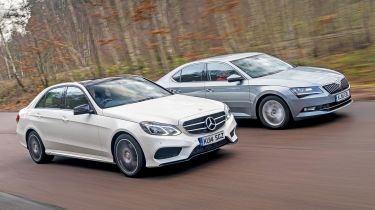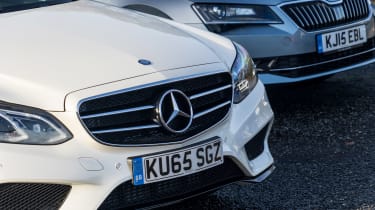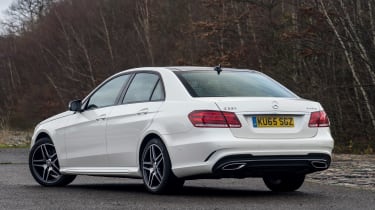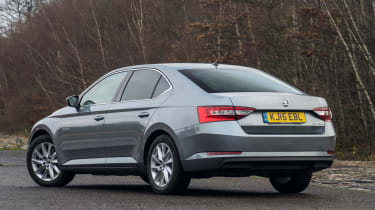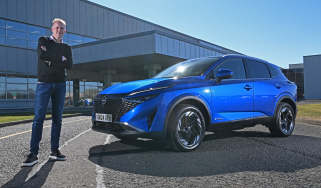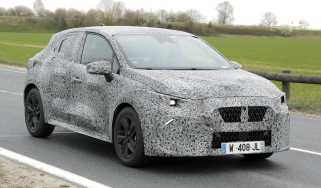Used Mercedes E-Class vs New Skoda Superb
Family cars: Spacious, upmarket Mercedes E-Class and Skoda Superb do battle
The latest Skoda Superb is arguably the ultimate family car. Stylish, practical, good to drive and cheap to run, it has everything a growing family could need, particularly in well equipped SE Business guise.
Compared to its rather frumpy predecessor, the current Superb is packed with eye-catching design details. Ditching the old car’s novel Twindoor tailgate has allowed a sleeker and more dynamic shape. With its chiselled nose, swept-back headlamps and sharp creases cut into its flanks, the Skoda really stands out. Even on the SE Business model’s smaller 17-inch wheels, it has more than a dash of premium appeal.
Yet if you’re looking for an upmarket image, even the smart Superb has to give best to the lure of the three-pointed star. The Mercedes E-Class isn’t as attractive, but it has plenty of presence with its mix of upright lines, prominent grille and badge. And as it was last facelifted in 2013, even a two-year-old car looks just like a box-fresh model. Go for the sporty AMG Line like the car in our pictures, and you’ll get smart 18-inch alloys and a subtle bodykit.
The Mercedes’ classy ambience continues inside, where you’ll find top-notch materials, leather seats and faultless build quality. Even after a couple of years and a few thousand miles, the cabin looks and feels like it belongs to a car with delivery mileage. With its cliff-face dashboard and angular styling details, it’s not the last word in cutting-edge design, but it’s logically laid out and easy to get on with. Even using the single stalk for the wipers, indicators and lights becomes second nature very quickly.
Used - available now

2020 Mercedes
E Class
16,426 milesAutomaticDiesel2.0L
Cash £30,587
2023 Mercedes
E Class
26,869 milesAutomaticDiesel2.0L
Cash £34,500
2022 Mercedes
E Class
46,558 milesAutomaticPetrol2.0L
Cash £26,400
2020 Mercedes
E Class
68,504 milesAutomaticDiesel2.0L
Cash £18,277By contrast, the Skoda’s cabin looks slick and bang up to date. Better still, the plastics are more or less a match for those in the Mercedes, as is the solid quality. Elsewhere, much of the switchgear is borrowed from the pricier VW Passat, but it’s well integrated.
• Best executive cars to buy right now
There’s little to separate our new and used models for kit. Both get climate control, Bluetooth and DAB radio, while the Skoda adds sat-nav – although many E-Classes will have had the route-finding kit added as an option when new. The Superb also includes adaptive cruise control and autonomous emergency braking, while lane keep assist and blind spot monitoring are an £850 option. The Mercedes Driving Assistant package cost over twice that when new, but search around and you’ll find a number of used examples are fitted with this desirable kit.
Both cars are spacious and make plenty of sense for families, yet the Skoda just edges ahead with its hatch layout, 625-litre boot and a rear compartment that provides a fraction more legroom. That said, the E-Class is hardly cramped, and for an extra £1,000 you can bag a cavernous Estate, which boosts carrying capacity from 490 to 600 litres – a Superb wagon will set you back an additional £1,200.
These models are evenly matched when it comes to showroom appeal, but out on the road it’s the new car that takes the advantage. The Skoda’s 148bhp 2.0-litre engine doesn’t have the outright firepower of the E220’s larger unit, yet thanks to the Superb’s lower kerbweight it feels just as lively. The TDI powerplant is also smoother, while the six-speed DSG auto serves up quick and unobtrusive gearchanges.
Yet it’s the Skoda’s agility that really gives it the edge. The steering is quicker and more direct, while the standard torque-vectoring system helps the front-wheel-drive car cling doggedly to your chosen line.
That said, the Mercedes is still good to drive. It can’t match the Superb for nimble handling, but its steering is precise and naturally weighted, plus grip and body control are good. It’s refined and rides well, too. Standard adaptive dampers allow it to soak up bumps with a touch more composure than the Skoda, while wind and road noise are well suppressed.
It’s a shame the 2.1-litre diesel is so vocal, particularly at idle and when it’s extended. Still, it’s hushed during normal driving, and the seven-speed auto effortlessly shuffles ratios. With CO2 emissions of 128g/km and claimed 57.7mpg, the E220 will cost a little more to run, plus Mercedes’ servicing figures are steeper, too. Neither will you benefit from a three-year warranty – although buy it through the brand’s approved used scheme and you’ll at least get a two-year guarantee.
You’d be happy with either of these contenders. Both are desirable, spacious, well equipped and reasonably cost-effective to run. The Mercedes oozes upmarket appeal, plus it’s refined and comfortable. Yet in the final reckoning, the Skoda’s style, space, lengthy kit list, sharp dynamics and new car appeal are hard to resist.
Specifications
| Model: | Mercedes E220 CDI AMG Line | |
| Price: | from £23,500 | |
| Engine: | 2.1-litre 4cyl turbodiesel, 175bhp | |
| 0-62mph: | 8.3 seconds | |
| Economy/CO2: | 57.7mpg/128g/km | |
| Road tax: | £110 | |
| Model: | Skoda Superb TDI SE Business | |
| Price: | £23,490 | |
| Engine: | 2.0-litre 4cyl turbodiesel, 148bhp | |
| 0-62mph: | 0-62mph: 8.6 seconds | |
| Economy/CO2: | 62.8mpg/118g/km | |
| Road tax: | £30 | |
